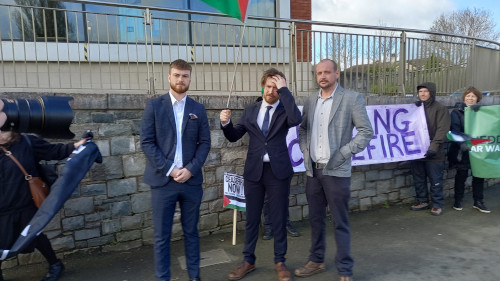
Owain Parry, Thomas Bell and Mark Redfern carried out a 14-hour rooftop occupation of the Solvay factory in Wrexham, Wales, in November 2021 (the action was co-ordinated by Palestine Action). They accused Solvay of manufacturing components for the Israeli military.
This was admitted by the company at the recent five-day trial of the Solvay Three at Caernarfon crown court. The firm said that it supplied components for Israeli F-35 fighter jets.
The three members of the Welsh Underground Network left court on 19 April ‘guilty’ of criminal damage, but with a moral victory in the eyes of many, with an extremely light sentence despite all their legal defences being thrown out.
After Thomas Bell’s closing speech, the judge is reported to have said: ‘That was the most moving speech I have ever heard in this courtroom.’
The fines and compensation orders, totalling around £550 each, were directed by the judge to go to the fire service, which was involved in bringing them down from the rooftop. No money is going to Solvay itself, despite its claimed £60,000 losses, according to a court report in voice.wales, the online radical media site.
Owain Parry accepted a plea deal offered by the prosecution at the last minute. Thomas Bell and Mark Redfern were, surprisingly, only fined £15 more than him, despite continuing to plead ‘not guilty’.
The Welsh Underground Network is an above-ground group that describes itself as ‘a Marxist-Leninist organization fighting for a Welsh Socialist Republic – primarily through community action’.
Confusingly, the Wrexham branch of Solvay has been renamed ‘Cytec UK’ and the parent company has also changed its name from ‘Solvay’ to ‘Syensqo’.
-------------------
Thomas Bell’s speech
On 19 April, Thomas Bell, Owain Parry and Mark Redfern, the Solvay Three, were convicted of criminal damage to an arms factory that was supplying the Israeli military. (See here for the main story on their action and their trial.)
Thomas Bell’s closing speech was reportedly described by the judge as ‘the most moving speech I have ever heard in this courtroom.’
This is the text of his speech, as transcribed by voice.wales, the online radical media site:
‘Ladies and gentlemen of the jury, the right to protest is a very human right. And I mean not only in the eyes of the law, but as something innate to human behaviour, we feel the need for action when we believe something is wrong.
‘Wales is my home and has always been a nation of peace and a place that has a door open for those who need somewhere to keep warm.
‘In 1923, the women of Wales organised an unprecedented appeal. 390,296 women signed a memorial petition through the Welsh League of Nations Union, appealing to the women of America “from home to home” and “hearth to hearth”, to join them in a call for “Law not War”.
‘It was noted that the final petition was over seven miles in length, all handwritten by the beautiful women of Wales.
‘The list of names is being digitised online and you can even see the addresses these women lived at. Maybe you’re from a house of a woman who demanded peace.
‘Now I stand before you today as a man of Wales. A man who knows well what it means for a people to be disregarded in their own home, left defenceless.
‘We know, that in the eyes of the law, that we have been left with no legal defence to rely on for our actions. But our actions need no defence, for we do not defend them. We have no regrets and carry no guilt. We have only played our part in the story of peace in Wales, and there will be a happy ending to that story, like the fairy tales told to us as children.
‘But the children in Palestine aren’t as lucky. I mentioned the other day [referring to his earlier evidence, given in the witness box] the story of the Bakr children on the beach in Gaza. Cousins, family, playing football and other games under the hot sun. They heard no fairytales, only the singing of drones day in and day out, until the last thing they heard was the screams of each other dying. They were so young.
‘I ask myself these questions: “What line do we draw in the sand? How many links in the chain around the neck of the disenfranchised is enough for us to get to sleep at night? How complicit are we willing to be?” Companies think they are above the law, but I don’t believe that’s right.’
Thomas Bell then ended his speech by reading out the poem ‘If I Must Die’ by Palestinian scholar, writer and activist Refaat Alareer, who was targeted and killed by Israeli drones in Gaza last December.

